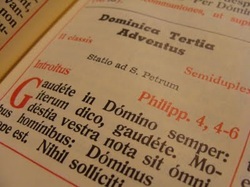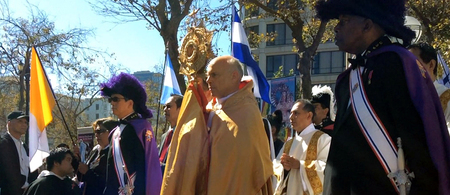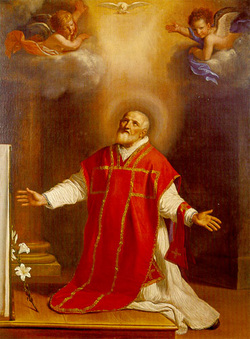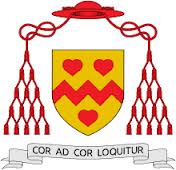
Today, the Third Sunday of Advent, is “Gaudete Sunday,” so named from the first word of the entrance verse for the Mass: Gaudete in Domino semper: iterum dico, gaudete “Rejoice in the Lord always: again I say it, Rejoice!... the Lord is near” (Phil 4:4). The priest and the altar clad themselves in rose colored vestments to express the Church’s joyful expectation of the Lord’s imminent arrival. We anticipate the Lord not with fear and trembling but with steadfast joy. The Prophet Isaiah’s joy flows from his heart and soul: “I rejoice heartily in the Lord, in my God is the joy of my soul.” His joy is that of one sent to bear glad tidings to a people in darkness; an exultant energy, as Our Lady went in haste to bring Jesus to her cousin Elizabeth.
This Present Darkness
Next Sunday will be the darkest day of the year, the day before the Winter Solstice. There is no longer and colder night than December 21st. Christmas brightens the long winter of our earthly exile. In this month of December the Church celebrates feasts of light. On Monday we celebrated the Immaculate Conception, the “white dawn announcing the Son’s rising.” Yesterday it was St. Lucy, a child martyr of the 3rd century whose names means light (Lucy from “lux”), and whose radiant joy overcame the hatred of her executioners. In ten days we celebrate the greatest of all Festivals of Light, the star of Bethlehem, the radiance of angels over nighttime flocks, the Solemnity of Christmas. “O that birth forever blessed,” writes Aurelius Prudentius in his 4th century hymn. “When the Virgin, full of grace, Overshadowed by the Spirit, Bore the Savior of our Race.” It is by virtue of His birth that St. Paul can command us in the Epistle to “rejoice always.”
Anyone can rejoice in every circumstance if he knows that God is with him, because joy is a virtue, not merely a feeling. Joy is an act of the will, sometimes difficult, but always possible to men of faith. We do not have to be sad, we do not have to be negative; we can choose to smile into the darkness, to sing while we work at even disagreeable tasks. “Rejoice always. Pray without ceasing. In all circumstances give thanks.” ‘Always’ because God is with us in every circumstance. Joy is a virtue that becomes less difficult and more perfect with practice.
“Make Straight the Path”
In the Gospel, John is baptizing at the River Jordan, and some priests ask him: who are you? He tells them that he is not the Messiah, but a voice in the desert crying out “make straight the way of the Lord.” The sad and lonely desert, the dangerous and frightening wilderness, is spreading. Senselessness, perhaps guided by calculated demonic fury, is undermining the once solid foundations of an earlier Christian era. Two years ago today a young man drove up to Sandy Hook Elementary School and shot 20 children. Two days ago a 22-year-old man opened fire at Rosemary Anderson School in Oregon. School shootings are relatively common now, but unknown just a generation ago. What has changed? Well, we can hardly expect people not to kill children when our government subsidizes child murder under another name. Not 20 children but 20,000 children die every day in this world through government-subsidized abortion.
It is always darkest before dawn. We cannot lift the darkness—only God can save our world—but we can make straight the path. It is the joyful penances of Advent, our spiritual preparation, that make Christmas the most joyful season of the year. Take those spiritual practices away, and Christmas loses its joy. It becomes just another commercial event, driven by blind market forces.
“Joy is prayer - Joy is strength - Joy is love - Joy is a net of love by which you catch souls,” wrote Mother Teresa. If you pray, you will be joyful, because you will see light in even the deepest darkness. Go to Mass every week, every day if possible, and bring your friends. Make a good confession, schedule in a weekly holy hour, pray the rosary, and you will radiate the light of a joyful Christian. “Pow’rs, dominions bow before him, the babe, the world’s redeemer,” wrote Aurelius Prudentius 1600 years ago. “Now he shines, the long expected. Let creation praise its Lord.”





 RSS Feed
RSS Feed